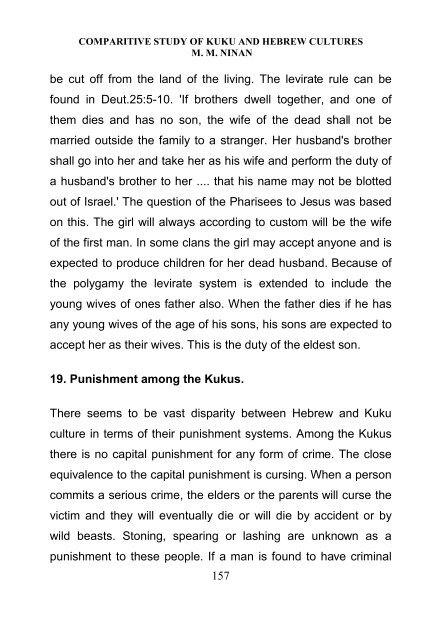Cultural Anthropology for Missions
You also want an ePaper? Increase the reach of your titles
YUMPU automatically turns print PDFs into web optimized ePapers that Google loves.
COMPARITIVE STUDY OF KUKU AND HEBREW CULTURES<br />
M. M. NINAN<br />
be cut off from the land of the living. The levirate rule can be<br />
found in Deut.25:5-10. 'If brothers dwell together, and one of<br />
them dies and has no son, the wife of the dead shall not be<br />
married outside the family to a stranger. Her husband's brother<br />
shall go into her and take her as his wife and per<strong>for</strong>m the duty of<br />
a husband's brother to her .... that his name may not be blotted<br />
out of Israel.' The question of the Pharisees to Jesus was based<br />
on this. The girl will always according to custom will be the wife<br />
of the first man. In some clans the girl may accept anyone and is<br />
expected to produce children <strong>for</strong> her dead husband. Because of<br />
the polygamy the levirate system is extended to include the<br />
young wives of ones father also. When the father dies if he has<br />
any young wives of the age of his sons, his sons are expected to<br />
accept her as their wives. This is the duty of the eldest son.<br />
19. Punishment among the Kukus.<br />
There seems to be vast disparity between Hebrew and Kuku<br />
culture in terms of their punishment systems. Among the Kukus<br />
there is no capital punishment <strong>for</strong> any <strong>for</strong>m of crime. The close<br />
equivalence to the capital punishment is cursing. When a person<br />
commits a serious crime, the elders or the parents will curse the<br />
victim and they will eventually die or will die by accident or by<br />
wild beasts. Stoning, spearing or lashing are unknown as a<br />
punishment to these people. If a man is found to have criminal<br />
157


















